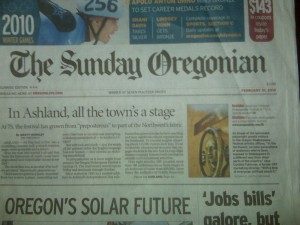You’ve probably heard the news already. On Wednesday The Oregonian laid off 37 workers, 27 in the newsroom. The cuts have long been expected. Like the rest of the daily newspaper industry, the (not so) Big (anymore) O is trapped in a nightmare downward spiral triggered by landmark technological shifts, declining readership and, OK, its own reluctance to change with the times.
 I’ve waited to write this because even now I don’t know all of the names of the people who’ve been laid off. Lips have been tight, although The Mercury’s Matt Davis has ferreted out most of the hit list here. Predictably, a lot of online smart-alecks have been snickering about this. Don’t know what to tell them except they’re insanely stupid, and callous to the extreme. These are good, talented people, most of them extraordinarily dedicated to the public good, who are now out of work.
I’ve waited to write this because even now I don’t know all of the names of the people who’ve been laid off. Lips have been tight, although The Mercury’s Matt Davis has ferreted out most of the hit list here. Predictably, a lot of online smart-alecks have been snickering about this. Don’t know what to tell them except they’re insanely stupid, and callous to the extreme. These are good, talented people, most of them extraordinarily dedicated to the public good, who are now out of work.
The possibly mortal weakening of the mainstream American press is nothing but bad news for our fragile democracy (or republic). Without the newspapers’ checks and proddings, who will speak authoritatively to power? In October of 2008 I wrote about the problems facing the news industry, and although that post offers no solid solutions (I’m no wizard), I think it lays out the difficulties pretty well.
Up until now, The Oregonian has managed the illness of its industry with remarkable grace. Maybe it hasn’t come up with answers (and maybe I’ve been frustrated by what’s sometimes seemed like a paralysis of will), but it has treated its people well, offering several generous buyout packages to its workers instead of just dumping them by the wayside, as so many other papers have. I took a buyout two years ago. My wife took one last May.
Pretty much everyone who was going to leave voluntarily has left. Now, the O has no real choice but to make the tough cuts by layoff. They’ve begun, and there could be more. I don’t pretend to understand how the decisions were made on who went and who stayed. Faced with the extraordinary difficulties of having to make these decisions about people’s lives and livelihoods, my own list would have been different in several particulars. But there’s no good way to do this thing.
 Today, after a matinee performance of All’s Well That Ends Well, the extended Scatter Family leaves Ashland and the
Today, after a matinee performance of All’s Well That Ends Well, the extended Scatter Family leaves Ashland and the 